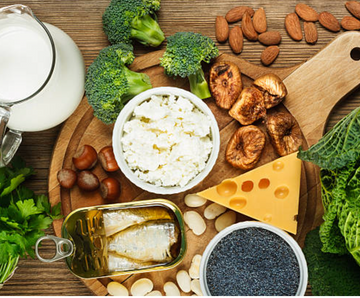What is calcium?
Calcium is an essential mineral that makes up most of our bones and teeth, keeping them strong and healthy. However, calcium also has other roles in the body, such as regulating blood vessels, muscle function, hormone secretion, and blood clotting. Most of the calcium in our body is stored in our bones.1
Why is calcium important?
Not consuming enough calcium can reduce the strength of your bones which can lead to osteoporosis. 1 With at least 1 in 5 Australians over the age of 75 having reported low bone density or osteoporosis, it is increasingly important to be aware of your calcium intake. 2
Women especially are at risk of osteoporosis. Menopause leads to bone loss, due to decreases in hormones reducing the amount of calcium you absorb and increases in the amount of calcium you lose through urine. 1 Therefore, it’s vital you consume enough calcium to maximise your bone mass, and prevent the risk of osteoporosis, and therefore the risk of bone fractures later in life. 3
Calcium in Food
Be Fit Food Meals with at least 200mg of calcium include:
- Baked Bean Feta & Bowl with 322mg
- Mixed Berry Bircher with 276mg
- Cauliflower Leek and Bacon Soup with 264mg
- Choc Coconut Protein Bircher with 260mg
- Trio of Greens soup with 224mg
- Vegetable & Chickpea Frittata with 209mg
Other sources of calcium
- Milk
- Yoghurt
- Cheese
- Canned sardines and salmon with bones
- Kale and cooked spinach
- Calcium supplements
Please speak to one of our Accredited Practising Dietitians for more information.
References
- Institute of Medicine. Dietary Reference Intakes for Calcium and Vitamin D. Washington, DC: The National Academies Press; 2011.
- Australian Institute of Health and Welfare. Osteoporosis. Canberra: AIHW; 2020.
- Pouresmaeili F, Kamalidehghan B, Kamarehei M, Goh YM. A comprehensive overview on osteoporosis and its risk factors. Ther Clin Risk Manag. 2018 Nov; 14:2029-2049.









